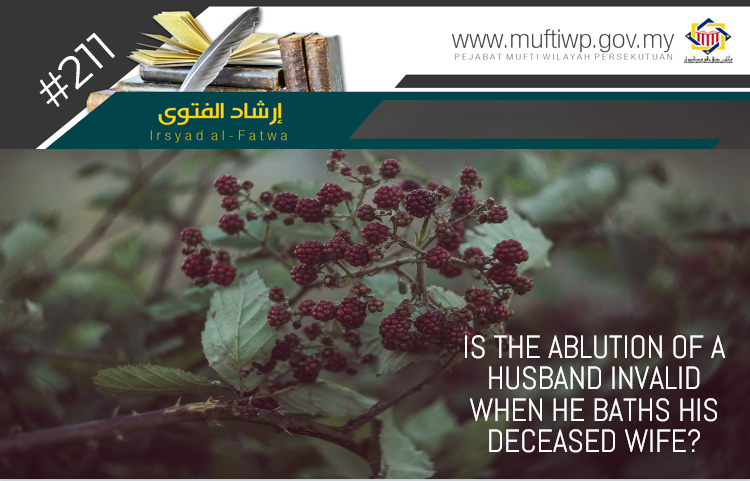Question:
Assalamualaikum, is the ablution of a husband invalid when he baths his deceased wife?
Answer:
Alhamdulillah, praise and thanks to Allah SWT for the countless blessings He has blessed us all with. Blessings and salutations to the prophet Muhammad PBUH, his family, companions and all those that follow his teachings.
In answering the issue regarding whether or not the ablution of someone is invalidated when one baths a deceased of the opposite gender, we must first explain the ruling of a man bathing a deceased woman or vice versa.
The Ruling for A Man Bathing A Deceased Woman
Referring to Fiqh books written by Islamic scholars, they state that it is prioritized for a deceased man to be bathed by a man, and for a deceased woman to be bathed by another woman.
However, there are several narrations from the Prophet PBUH that state that a husband is permissible to bath his wife, and it is permissible for a woman to bath her husband. This is in accordance with a hadith narrated by Umm al-Mu’minin Aisyah R.Anha, where she said:
رَجَعَ رَسُولُ اللَّهِ ـ صلى الله عليه وسلم ـ مِنَ الْبَقِيعِ فَوَجَدَنِي وَأَنَا أَجِدُ صُدَاعًا فِي رَأْسِي وَأَنَا أَقُولُ وَارَأْسَاهُ فَقَالَ " بَلْ أَنَا يَا عَائِشَةُ وَارَأْسَاهُ " . ثُمَّ قَالَ " مَا ضَرَّكِ لَوْ مِتِّ قَبْلِي فَقُمْتُ عَلَيْكِ فَغَسَّلْتُكِ وَكَفَّنْتُكِ وَصَلَّيْتُ عَلَيْكِ وَدَفَنْتُكِ
“The Messenger of Allah PBUH came back from Al-Baqi’ and I had a headache and was saying: ‘O my head!’ He said: ‘Rather, I should say, O my head, O ‘Aishah!’ Then he said: ‘It will not matter if you were to die before me, for I will take care of you, wash you, shroud you, offer the funeral prayer for you and bury you.’”
Sunan Ibn Majah (1465)
According to the above hadith, it states that the Prophet PBUH himself would bath his wife Aisyah R.Anha if she dies before the Prophet PBUH. This is a sign from the Prophet PBUH which shows that it is permissible for a husband to bath his wife.
The same is stated in a narration from Abdullah bin Abi Bkar, where Asma’ binti ‘Umais bathed the deceased Abu Bakr al-Siddiq when he passed away. Refer Al-Muwatha’, Malik bin Anas (1/223).
Asma’ stated above is the wife of Abu Bakr al-Siddiq and there is another narration which states that Asma’ bathed Abu Bakar following his instructions before he died. This is in accordance with a narration from Umm al-Mu’minin Aiyah R.Anha, where she said: “Abu Bakr al-Siddiq died on Tuesday night of 8th Jamadil Akhir in the year of 13H. He asked that he should be bathed by Asma’ binti ‘Uwais, who is his wife.” Refer Al-Sunan al-Kubra, Al-Baihaqi (3/397).
Thus, a conclusion that can be made from the two narrations stated above is it is permissible for a husband to bath his deceased wife and it is also permissible for a wife to bath her deceased husband. This is after taking into consideration that there is no evidence that prohibits it, thus it falls to its original ruling, which is it is permissible. Furthermore, Imam Ibn al-Munzir Rahimahullah said there are five scholarly consensuses (ijma’) regarding this issue: “And they (the fuqaha) issued the ijma’ that a wife is permissible to bath her deceased husband.” Refer al-Ijma’, Ibn al-Munzir (pg. 44).
Is the Ablution of a Husband Invalid If He Bath His Deceased Wife?
In answering this question, we would like to share the opinions of fuqaha scholars that discussed this issue. Imam al-Khatib al-Sharbini Rahimahullah said: “It is permissible for a man to bath his wife that was divorced with talak other than raj’ie, even if he has remarried, and it is permissible for him to bath his woman slave, even if his slave is a woman of the book. And it is permissible for a wife who was divorced with talak other than raj’ie to bath her deceased husband even if she was once married to another man, without touching her husband (when bathing her husband) and her husband or the master (of women slaves) not touching her.” See al-Iqna’, Al-Khatib al-Syarbini (1/410).
Imam al-Bujairimi al-Syafi’e when commenting on this statement said that the statement means: “The restriction means that it is sunnah to not touch (the body of the deceased). This is due to the fact that according to a final opinion, it is permissible for a husband to see the deceased body of his wife and it is also permissible for a wife to see the deceased body of her husband, even the aurah. Furthermore, according to a final opinion it is also permissible to touch the body of the deceased.” Refer Tuhfat al-Habib ‘ala Syarh al-Khatib, (2/268-269).
Al-Bujairimi continue on commenting on the words of al-Khatib saying: “(It is prohibited for a man to touch the body of his woman slave): This is to ensure that the ablution of the individual that touch the deceased is not invalid, and the ablution of the person that is touched is not invalid (absolute)”. Refer Hasyiah al-Bujairimi (2/269).
However, the final opinion states the permissibility of touching does not wipe out the ruling of invalidation of ablution through touching. Which means, if a husband is not in pure state (in ablution) then it is permissible for him to touch the deceased body of his wife as long as he does that without having lust.
Conclusion
After analysing the opinions from scholars of madhhab al-Imam al-Syafie regarding this issue, we hold the opinion that a husband that bath his wife while touching the skin of his wife, then his ablution is invalidated. Consequently, he should bath his wife wearing gloves, or using towels or cloths to wipe his wife’s body. This is what has been encouraged and a sunnah, to avoid skin contact that will invalidate ablution. May this explanation help us in understanding our religion better. Ameen.


